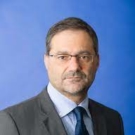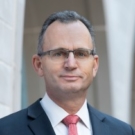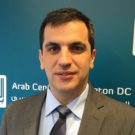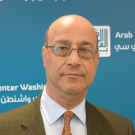Speakers

Joseph Bahout
Visiting Scholar, Middle East Program
Carnegie Endowment for International Peace

Paul Salem
Senior Vice President for Policy Analysis, Research and Programs
Middle East Institute
Moderator
Event Summary
Arab Center Washington DC (ACW) held a panel discussion at the National Press Club on November 29, 2017 titled “What’s Next for Lebanon?” Speakers were Paul Salem, Senior Vice President for Policy Analysis, Research and Programs at the Middle East Institute; Joseph Bahout, Visiting Scholar, Middle East Program at the Carnegie Endowment for International Peace; and Joe Macaron, Resident Analyst at ACW.
Panel moderator Imad Harb, who serves as Director of Research and Analysis at ACW, described Lebanon as experiencing complicated political, sectarian, and economic tensions, including “the threat of the failure of the constitutional order as Hezbollah mounts a challenge as a state-within-a-state.” Regionally, the extremist challenges of al-Qaeda and the Islamic State and the repercussions of the war in Syria constitute factors of instability, especially since Lebanon now hosts an estimated 1.5 million Syrian refugees. “As a purported model of pluralist existence where 17 different religious sects and a healthy constituency of secularists interact,” Harb said, Lebanon also commands the attention of the international community.
Joe Macaron said that the remarkable aspect of the latest crisis—the resignation of Lebanese Prime Minister Saad Hariri on November 4, after being summoned to Saudi Arabia—was that it was not a product of Lebanese politics. Macaron cited three main factors that will influence what might come next for Lebanon. First, the relationship between the Hariri family and the Saudis is central to the crisis, and the prime minister now has to balance his leadership in Lebanon with his relations with Riyadh, which have changed dramatically—though “he will not get out of the Saudi orbit,” Macaron said.
Second, the Lebanese political system, though flawed, has matured in managing political tensions and this was key to overcoming the latest political difficulties. The alliance among Saad Hariri, Druze leader Walid Joumblatt, Lebanese President Michel Aoun, and the two Shia parties will be crucial for the elections in May 2018, Macaron noted, adding that he believes the five oligarchies will “sweep the floor” of the elections. “The Lebanese system has an acrobatic way of always finding new formulas that please everyone and not please anyone at the same time,” he remarked.
Third, regarding external powers, he said that US and Iranian influence in Lebanon has been increasing since 2014, notwithstanding Washington’s concern that the recent events with Saudi Arabia might push Lebanon toward Iran and Russia. He noted that the winding down of the Syrian war and a nonviolent transition in Syria would reemphasize the need to have a stable Lebanon. “The big question is what will happen next door in Syria,” Macaron concluded.
Joseph Bahout characterized Saad Hariri’s resignation on November 4 as “a cataclysmic day in Lebanon” and a first episode in the context of the “collision course between Iran and Saudi Arabia” in the region. Bahout said that two other important and related events occurred on the same day as the Hariri resignation: the “famous purge” in Saudi Arabia and the missile lobbed from Yemen that landed in Riyadh. A number of international actors, including France, Egypt, and some parts of the US administration, applied pressure on the Saudi leadership to resolve Hariri’s resignation issue.
Bahout said that Hariri is now politically weaker, having not negotiated his resignation or bargained for conditions for his return to Lebanon. Although the developments seem to have strengthened Hariri’s relationship with the “Sunni street” and he “is still the patron of his street,” Bahout said that this could be a temporary situation, especially with the upcoming elections in the country. “We are seeing a reshuffling of alliances in Lebanon,” he noted, in which Saad Hariri is now much more structurally close to Aoun, Joumblatt, Hezbollah, and Nabih Berri (Speaker of the Parliament and head of the Amal Movement) than to his March 14 Alliance; indeed, he added that “alliances [in Lebanon] have been upset because of what happened in Saudi Arabia on November 4.”
Bahout asked, “What is the Saudi endgame?” At present, Riyadh has effectively “lost Syria” and is involved in a quagmire in Yemen, although the essential issue in this crisis is not Yemen but Hariri’s negotiations with Hezbollah, Bahout noted. Saudi Arabia’s real motive in the Hariri episode is a big unknown, he said, adding that “I think for all these reasons, domestic, regional, and international, the crisis is far from being over.” The fight in the region is between Saudi Arabia and Iran, and the Saudis know that the Trump Administration is staunchly anti-Iranian. Therefore, they regard this as a window of opportunity, with Lebanon as one factor in the equation. Bahout questioned, “Will the Saudi leadership use this golden opportunity to try and topple the equilibrium in the region?”
Paul Salem remarked that “it is significant that US policymakers [in the Defense and State Departments] do look at Lebanon as having pretty considerable strategic importance as a space on the eastern Mediterranean.” The pluralistic and generally stable country is also viewed as “a contested space” regionally and domestically because of influence by Iran, Hezbollah, the Assad regime, and the Russians as well as some popular support for Hezbollah. The episode of Hariri’s resignation was a Saudi—and not Lebanese—one, he said. What the leaders in Riyadh “are beginning to see is that Iran is going to be able, and is succeeding, in building a massive missile presence in Yemen to permanently hold Saudi Arabia strategically threatened and hostage… This is an existential thing for Saudi Arabia.” The Saudis want Hezbollah to cease its military engagement in Yemen and its political media campaign against the kingdom, he said, though Nasrallah recently denied Hezbollah’s involvement there and made conciliatory remarks. Salem said at present, Saudi Arabia does not have a strategy to push back against Iran.
Stability in the region is a fundamental Arab concern, Salem asserted, although he did not think there would be any resolution to the Palestinian issue anytime soon. He said that Egypt played an important role when it sent Foreign Minister Sameh Shoukry for urgent talks with Arab states after Hariri’s resignation—“Egyptians helped the Saudis climb down from the maximalist position they were in.” Saad Hariri is now more popular in Lebanon, he noted, and Lebanon’s own stability and security are paramount to the Middle East and internationally. Salem said that the elections slated for May 2018, if they are actually held, may not result in dramatic change, as Hezbollah and the March 8 Alliance would still have the upper hand.
Event Photos


